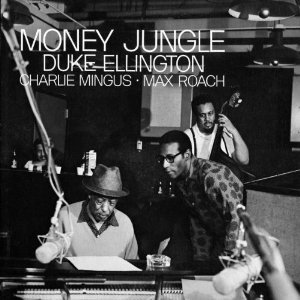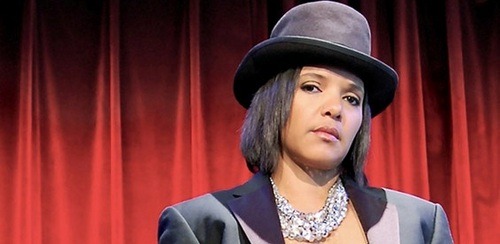
Fifty years ago next month three musicians released an album that five months earlier they had got together to record. They weren’t just any musicians. But together they hadn’t recorded before, and would never do so again. A half a century on following the collapse of Lehman Brothers, the post-credit crunch world where the banks have lost their once invincible air of respectability, big business still rules the money jungle. The album using those two words, and a new meditation on our western economy as a failed way to live, is marked next month with the release of Money Jungle: Provocative in Blue by Terri Lyne Carrington. On the cover of the original artwork of the LP of Money Jungle the biggest point size of the lettering for the musicians is accorded to Duke Ellington, then as now a talismanic figure whose music reached musicians and non-musicians alike the world over. Four days before the Money Jungle sessions it was business as usual for Duke, and with his orchestra he was in a New York studio recording tracks such as ‘Monk’s Dream’, ‘Do Nothin’ Till You Hear For Me (Concerto for Cootie’), and ‘The Lonely Ones’.
The seventeenth of September 1962 was different though, and with the maverick Mingus and bebop pioneer Roach rather than the gathered ranks of the orchestra this was a pared down piano trio album, like no other in Ellington’s vast discography before or since. Why so? Well, first of all because of the power of the personalities you don’t think of it as a piano trio album which is weird. In recent years Vijay Iyer in some ways has showed the modern way to look at this album with, not a trio take although that would be interesting, but just him playing ‘Fleurette Africaine’ in a California studio that later appeared on his album, Solo.
Money Jungle isn’t about instrumentation, it’s about people and ideas. The songs are mainly by Ellington yet the politics are a communality of all three players’ expressed in different ways but essentially the same in the context of the civil rights movement.
Side one opens with ‘Money Jungle’ and then there’s the beautiful ‘Fleurette Africaine (African Flower)’, ‘Very Special’, and ‘Warm Valley’, with side two ‘Wig Wise’, ‘Caravan’, not Ellington’s tune but Juan Tizol’s, and finally ‘Solitude’. CD-era listeners will know the album differently and so perceptions have been altered by time as formats change. So the order of the songs were changed and unreleased songs ‘A Little Max (Parfait)’, ‘REM Blues’, ‘Switch Blade’, and ‘Backward Country Boy Blues’ were now heard for the first time.

Enter Terri Lyne Carrington fresh from the drummer’s Grammy winning success with her vocals-based album The Mosaic Project, and with the extra tracks in mind Provocative in Blue has kept these to the fore so ‘Backward Country Boy Blues’ is the third track with a Lizz Wright vocal, and the other unreleased 1963 tracks are also there plus originally released songs, though not ‘Warm Valley’, ‘Caravan’ and ‘Solitude’, as Carrington’s own tunes ‘Grass Roots’ and ‘No Boxes (Nor Words)’ plus pianist Gerald Clayton’s ‘Cut Off’ take their place.
Carrington says she first heard Money Jungle as a CD version in the new millennium and felt “something mysterious about it,” explaining further. “There was an energy that moved through the tracks. There was this tension that you could hear, and yet they fit together like a hand in a glove.”
Her rearranging of the album has many dimensions. It’s layered with a big cast and is very political. We look to jazz people to say it as it is, no nonsense, and that’s what TLC and her musicians do here. To rolling solo drums a voice at the beginning says: “People are basically vehicles to just create money, which must create more money to keep the whole thing from falling apart, which is what’s happening. There is no profit under the current paradigm in saving lives, putting balance on this planet, having justice and peace or anything else. You have to create problems to create profit”, at which Christian McBride kicks in with the loose strung sound of Mingus you recognise from the title track of Money Jungle. The track ends with a collage of voices including that of Dr Martin Luther King speaking in December 1963 and President Barack Obama.
On the second track there’s a link to jazz royalty with the voice of Clark Terry, one of Miles Davis’ early mentors in the rap at the beginning of ‘Fleurette Africain’, as spelt here, before Clayton against a luxuriantly laidback Carrington rhythm and a lovely bigger ensemble arrangement that still retains the intimacy of a small band and conjures that mystery Carrington has referred to in her original reaction to the album. The core band is Carrington with McBride and the piano and Rhodes of Gerald Clayton, but the cast is expanded as the album progresses; as a feminist statement track 11 is also significant with new singer/songwriter Shea Rose’s contribution extolling womanhood.
Uniting the past half century with the present at just under the five-minute mark the album goes almost silent, and no less a figure than Herbie Hancock, as “the voice" of Duke Ellington, says: “If jazz means anything at all, which is questionable, it means the same thing it meant to musicians 50 years ago: freedom of expression. I can’t help feeling that the music has outgrown the word jazz. The greatest danger to civilisation is that we don’t appreciate enough our natural heritage. Musicians of the past have influenced all musicians of the future. I think jazz will be listened to by the same people who listen to it now: those who like creative things, whether they understand them or not. If it is accepted as an art the popularity of it doesn’t matter. When you get into popularity then you’re talking about money, not music.”
After the original Money Jungle sessions, two days later Ellington played solo for a TV broadcast, and it was ‘Fleurette Africaine’ he played that day. A week later he was recording with John Coltrane for Impulse.
Stephen Graham
Money Jungle: Provocative in Blue (Concord) is released on 25 February. The cover of 1963 album Money Jungle, top. Terri Lyne Carrington, above